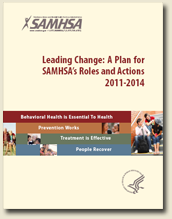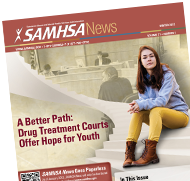SAMHSA's Eight Strategic Initiatives
 SAMHSA has identified eight Strategic Initiatives to focus its resources on areas of urgency and opportunity. They also will enable SAMHSA to respond to National, State, Territorial, Tribal, and local trends and support implementation of the Affordable Care Act and the Mental Health Parity and Addictions Equity Act.
SAMHSA has identified eight Strategic Initiatives to focus its resources on areas of urgency and opportunity. They also will enable SAMHSA to respond to National, State, Territorial, Tribal, and local trends and support implementation of the Affordable Care Act and the Mental Health Parity and Addictions Equity Act.
People are at the core of SAMHSA’s mission, and these Initiatives will guide its work through 2014 to help people with mental and substance use disorders and their families, build and support strong and supportive communities, prevent costly and painful behavioral health problems, and promote better health and functioning for all Americans.
- Leading Change: A Plan for SAMHSA's Roles and Actions 2011 – 2014 (pdf | 778 kbytes)
- Strategic Initiative Fact Sheet
SAMHSA Strategic Initiatives
-
Prevention of Substance Abuse and Mental Illness
Creating communities where individuals, families, schools, faith-based organizations, and workplaces take action to promote emotional health and reduce the likelihood of mental illness, substance abuse including tobacco, and suicide. This Initiative will include a focus on the Nation’s high-risk youth, youth in Tribal communities, and military families
Lead: Fran Harding, Director, Center of Substance Abuse Prevention
Initiative Page: http://www.samhsa.gov/prevention/
-
Trauma and Justice
Reducing the pervasive, harmful, and costly health impact of violence and trauma by integrating trauma-informed approaches throughout health, behavioral health, and related systems and addressing the behavioral health needs of people involved in or at risk of involvement in the criminal and juvenile justice systems.
Lead: Larke Huang, Director, Office of Behavioral Health Equity
Initiative Page: http://www.samhsa.gov/traumaJustice/
-
Military Families
Supporting America ’s service men and women—Active Duty, National Guard, Reserve, and Veteran—together with their families and communities by leading efforts to ensure that needed behavioral health services are accessible and that outcomes are positive.
Lead: A. Kathryn Power, Regional Administrator, Region 1
Initiative Page: http://www.samhsa.gov/militaryFamilies
-
Recovery Support
Partnering with people in recovery from mental and substance use disorders to guide the behavioral health system and promote individual-, program, and system-level approaches that foster health and resilience; increase permanent housing, employment, education, and other necessary supports; and reduce barriers to social inclusion.
Lead: Paolo del Vecchio, Director, Center for Mental Health Services
Initiative Page: http://www.samhsa.gov/recovery
-
Health Reform
Broadening health coverage to increase access to appropriate high-quality care and to reduce disparities that currently exist between the availability of services for substance abuse, mental disorders, and other medical conditions such as HIV/AIDS.
Lead: Suzanne Fields, Senior Advisor to the Administrator on Health Care Financing
Initiative Page: http://www.samhsa.gov/healthReform -
Health Information Technology
Ensuring that the behavioral health system, including States, community providers, and peer and prevention specialists, fully participates with the general health care delivery system in the adoption of Health Information Technology (HIT) and interoperable Electronic Health Records (EHR).
Lead: Westley Clark, Director, Center for Substance Abuse Treatment
Initiative Page: http://www.samhsa.gov/healthIT
-
Data, Outcomes, and Quality
Realizing an integrated data strategy and a national framework for quality improvement in behavioral health care that will inform policy, measure program impact, and lead to improved quality of services and outcomes for individuals, families, and communities.
Lead: RADM Pete Delany, Director, Center for Behavioral Health Statistics and Quality
Initiatives Page: http://www.samhsa.gov/dataOutcomes
-
Public Awareness and Support
Public Awareness and Support —Increasing the understanding of mental and substance use disorders to achieve the full potential of prevention, help people recognize mental and substance use disorders and seek assistance with the same urgency as any other health condition, and make recovery the expectation.
Lead: Nancy Ayers, Acting Director, Office of Communications
Initiative Page: http://www.samhsa.gov/publicAwareness
Stategic Initiatives Archive
- Leading Change: A Plan for SAMHSA's Roles and Actions 2011 – 2014 – (Complete Document) | PDF - 595kb (Original draft posted October 4, 2010)
- Public commenting and feedback (CLOSED)
Last updated: 01/04/2013
- FacebookExternal link. Please review our Disclaimer
- FlickrExternal link. Please review our Disclaimer
- RSS FeedsExternal link. Please review our Disclaimer
- SAMHSA BlogExternal link. Please review our Disclaimer
- TwitterExternal link. Please review our Disclaimer
- YoutubeExternal link. Please review our Disclaimer
- HHS Laws & Regulations
- The No FEAR Act
- e-Gov Content Inventory
- Health Insurance Portability and Accountability Act of 1996 (HIPAA)
- The President's New Freedom Commission on Mental Health
- Healthy People 2010
- The Children's Health Act of 2000 (Public Law 106-310)
- Confidentiality of Alcohol and Drug Abuse Patient Records (42 CFR, part 2)



